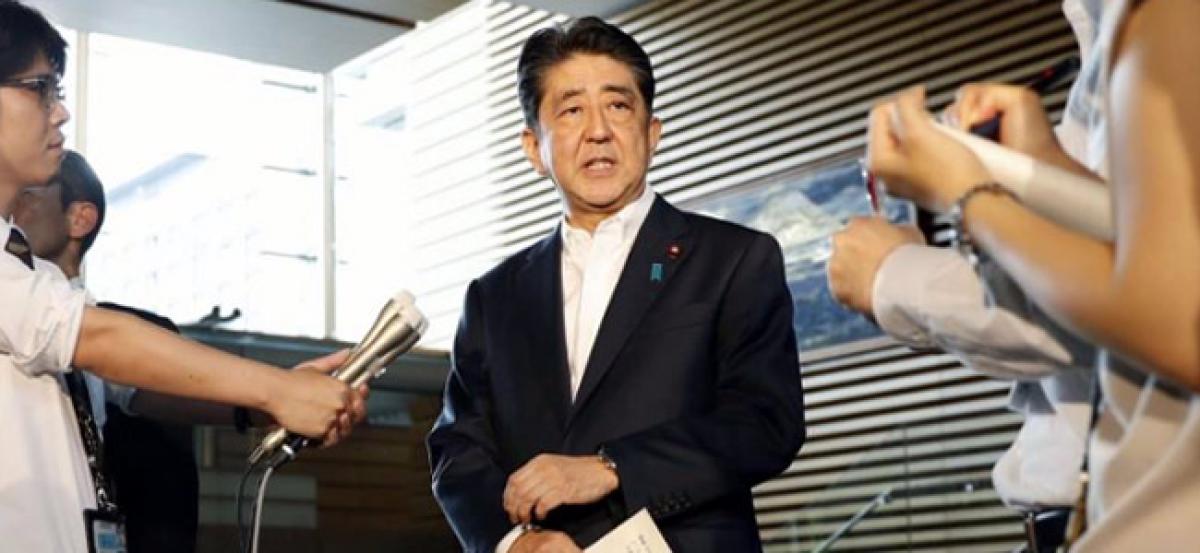Live
- Over 7,600 Syrians return from Turkiye in five days after Assad's downfall: minister
- Delhi BJP leaders stay overnight in 1,194 slum clusters
- Keerthy Suresh and Anthony Thattil Tie the Knot in a Christian Ceremony
- AAP, BJP making false promises to slum dwellers for votes: Delhi Congress
- 'Vere Level Office' Review: A Refreshing Take on Corporate Life with Humor and Heart
- Libya's oil company declares force majeure at key refinery following clashes
- Illegal Rohingyas: BJP seeks Assembly session to implement NRC in Delhi
- Philippines orders full evacuation amid possible volcanic re-eruption
- Government Prioritizes Welfare of the Poor, says Dola Sri Bala Veeranjaneyaswamy
- Two Russian oil tankers with 29 on board damaged due to bad weather
Just In

Ai Onodera was sound asleep in Hokkaido, northern Japan on Tuesday when an alarm on her mobile phone jolted her awake at 6:02 am: “Missile launch. Missile launch. North Korea appears to have fired a missile. Take refuge in a solid building or underground.”
TOKYO: Ai Onodera was sound asleep in Hokkaido, northern Japan on Tuesday when an alarm on her mobile phone jolted her awake at 6:02 am: “Missile launch. Missile launch. North Korea appears to have fired a missile. Take refuge in a solid building or underground.”
Four minutes earlier, at 5:58 a.m., North Korea had launched its first ballistic missile to fly over Japan since 2009, and it was headed her way, toward Japan’s northernmost main island.
Within three minutes of the launch, Prime Minister Shinzo Abe had ordered officials to gather and analyze incoming information. A minute later, the government sent out a “J-alert” on its nationwide warning system, telling northern residents including Onodera of the missile threat.
In a panic, Onodera turned on the TV. All channels were flashing a bulletin with the same warning. She quickly called her husband, who was away on a business trip.
“I was terrified that I wouldn’t see him again,” said the 33-year-old resident of Sapporo, Hokkaido’s capital.
Just a few short minutes after the first public warning, at 6:06 am, the missile entered the air space over Hokkaido, according to government bulletins released soon after.
By 6:07 am, the missile - travelling at close to 12,000 km/hour (7,500 miles per hour) and at a maximum altitude of 550 km (340 miles) - had hurtled across the island, flying out to sea.
CONFUSION, HELPLESSNESS
In many northern towns, sirens wailed and loudspeakers urged residents to take precautions, sending some scrambling to leave their houses while others confessed they had no idea what they should do.
Some people still living in temporary housing after the March 2011 earthquake and tsunami said on social media “What do they mean, solid buildings? We don’t have any.”
Local officials rushed to their offices hours early as trains in the region, including bullet trains from Tokyo to the north, were briefly halted.
“We felt helpless knowing there was nothing we could do even while a missile was passing through the skies of Japan,” said Hiroaki Kumasaka, 38, who works at a publishing company and was at Tokyo Station for a business trip up north.
“I sent a message to my family saying that ’Japan is no longer safe,’ and the stranger standing next to me shared the same sentiments with me,” he said.
In recent weeks, North Korea has launched a series of missiles toward Japan, but most of them fell into the Sea of Japan to the west of the country.
The growing threats have prompted several coastal towns on Japan’s main island of Honshu to hold missile drills. Hokkaido, a island of 5.5 million known for its ski resorts, seafood, beer and potatoes, was planning what appeared to be its first such drill this Friday.
At 6:12 am, some 14 minutes after it was launched near the North Korean capital of Pyongyang, the missile fell into the Pacific some 1,180 km (735 miles) east of Hokkaido's Cape Erimo.
The alert from the government’s Fire and Disaster Management Agency saying the missile had passed over Hokkaido was sent two minutes later.
Andrew Kaz, a 24-year-old American working as an assistant language teacher in the eastern Hokkaido city of Kushiro said he was worried about the potential response from Japan and the United States.
"I know this happened before but I feel small and rudderless," he told Reuters. "Everything seems like business as usual, but you can tell people are shaken up."

© 2024 Hyderabad Media House Limited/The Hans India. All rights reserved. Powered by hocalwire.com







